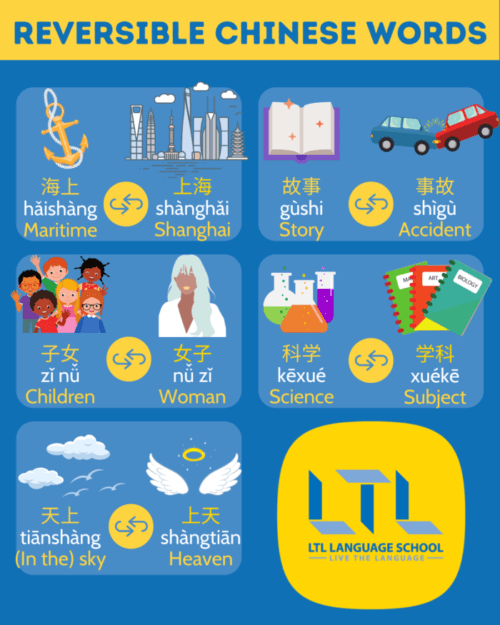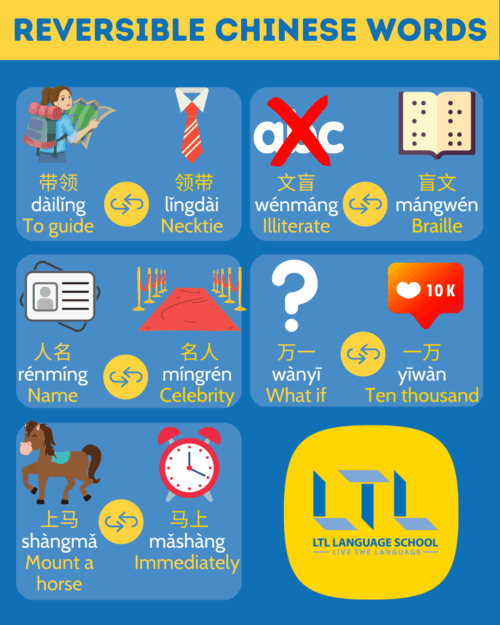What are Reversible Chinese Words?
Ever heard about Reversible Chinese Words?
The Chinese language, as you probably already know, is complex in its own way yet so fascinating to learn.
Today, we’ll introduce a new concept that has nothing to do with grammar or sentence structure, but that is still intriguing to know about: Reversible Chinese Words.
Have you ever noticed that sometimes two characters can be inverted and mean two completely different things?
It’s tricky for sure, and we’re here to teach you a few so you’ll know what to expect when you encounter them.
Let’s go!
Reversible Chinese Words | Verbs, Adjectives & Nouns
Reversible Chinese Words | Similar Meaning
Reversible Chinese Words | Closely Related Meaning
Reversible Chinese Words | Loosely Related Meaning
Reversible Chinese Words | Totally Different Meaning
Reversible Chinese Words | Logical Reversals
If you need to brush up on your character skills before, here’s a list of resources for you:
- The Chinese Alphabet
- Most Common Simplified Chinese Characters
- All 214 Chinese Radicals
- Chinese Character’s Stroke Order
Verbs, Adjectives & Nouns
Let’s start this Reversible Chinese Words guide with a simple concept first, that could actually be super useful for daily life!
Each of these verbs and adjectives, when reversed, become nouns.
Pretty cool, isn’t it?
| Chinese | English |
|---|---|
| 虚空 xūkōng | Empty |
| 煎熬 jiān’áo | To suffer |
| 情痴 qíngchī | To be infatuated |
| 报喜 bàoxǐ | To announce |
| 愿意 yuànyì | To wish for |
| 适合 shìhé | To suit |
| 年少 niánshào | Young |
| 忌妒 jìdù | To be jealous of |
| 金黄 jīnhuáng | Golden |
| 画图 huàtú | To draw |
| 犯罪 fànzuì | To commit a crime |
| 上楼 shànglóu | Go upstairs |
| 下楼 xià lóu | Go downstairs |
| 宵夜 xiāoyè | Have a midnight snack |
| Chinese | English |
|---|---|
| 空虚 kōngxū | Emptiness |
| 熬煎 áojiān | Suffering |
| 痴情 chīqíng | Infatuation |
| 喜报 xǐbào | Announcement |
| 意愿 yìyuàn | A wish |
| 合适 héshì | Appropriate |
| 少年 shàonián | Youth |
| 妒忌 dùjì | Jealousy |
| 黄金 huángjīn | Gold |
| 图画 túhuà | A drawing |
| 罪犯 zuìfàn | Criminal |
| 楼上 lóushàng | Upstairs |
| 楼下 lóuxià | Downstairs |
| 夜宵 yèxiāo | Midnight snack |
Similar Meaning
When these characters are reversed their meanings are still very similar.
BONUS | below the table of vocabulary we also created some flashcards which you can download, share and keep to study 🙂
If you mix them up in a sentence, the message you are trying to convey won’t change too much, and the listener won’t have problems understanding you.
It’s always good to know about them though!
Keep reading for more interesting characters reversals.
| Chinese | English |
|---|---|
| 讲演 jiǎngyǎn | Give a speech (v) / Lecture (n) |
| 觉察 juéchá | To perceive, to detect |
| 夜半 yèbàn | Midnight |
| 胆大 dǎndà | Bold, audacious |
| 依偎 yīwēi | To snuggle up to, lean close to |
| 喜欢 xǐhuan | To like, be fond of |
| 累积 lěijī | To accumulate |
| 互相 hùxiāng | Mutually, each other (adv) |
| 代替 dàitì | To replace, substitute |
| 问询 wènxún | To inquire, interrogate |
| 奋发 fènfā | Exert oneself |
| 质朴 zhípǔ | Simple, unadorned |
| 寂静 jìjìng | Quiet, still, silent |
| 情感 qínggǎn | Emotion, feeling |
| 别离 biélí | Take leave of, leave |
| 登攀 dēngpān | To climb, clamber, scale |
| 并吞 bìngtūn | To annex, absorb |
| 整齐 zhěngqí | Tidy, regular, neat |
| 虫害 chónghài | Crop damage from insect pests |
| Chinese | English |
|---|---|
| 演讲 yǎnjiǎng | Give a speech (v) / Lecture (n) |
| 察觉 chájué | Sense, become aware |
| 半夜 bànyè | Middle of the night |
| 大胆 dàdǎn | Bold, daring |
| 偎依 wēiyī | To snuggle/nestle up to |
| 欢喜 huānxǐ | To like, joyful (adj) |
| 积累 jīlěi | Accumulation (n) |
| 相互 xiānghù | Each other (adv), reciprocal (adj) |
| 替代 tìdài | Substitute for, replace with |
| 询问 xúnwèn | To ask (or inquire) about |
| 发奋 fāfèn | Work energetically |
| 朴质 pǔzhí | Simple, plain |
| 静寂 jìngjì | Quiet, silent |
| 感情 gǎnqíng | Sentiment, fondness |
| 离别 líbié | To leave, to part |
| 攀登 pāndēng | To climb, clamber, scale |
| 吞并 tūnbìng | To merge, annex |
| 齐整 qízhěng | Neat, uniform |
| 害虫 hàichóng | Destructive insect, pest |


Closely Related Meaning
When reversed, these words have a closely related meaning, but do NOT signify the same thing.
You’ll quickly understand:
| Chinese | English |
|---|---|
| 牛奶 niúnǎi | Milk |
| 蜂蜜 fēngmì | Honey |
| 猪肉 zhūròu | Pork |
| 菜油 càiyóu | Rapeseed oil |
| 蛇毒 shédú | Venom |
| 鸡肉 jī ròu | Chicken (meat) |
| 井水 jǐngshuǐ | Well water |
| 笔画 bǐhuà | Brush stroke |
| 租房 zūfáng | Rent an apartment |
| 和平 hépíng | Peace |
| 语言 yǔyán | Language |
| 开放 kāifàng | To open |
| 焰火 yànhuǒ | Fireworks |
| 雪白 xuěbái | Snow white |
| 彩色 cǎisè | Multicolour |
| 云彩 yúncai | Cloud |
| 明天 míngtiān | Tomorrow |
| 牙刷 yáshuā | Toothbrush |
| 计算 jìsuàn | To calculate |
| Chinese | English |
|---|---|
| 奶牛 nǎiniú | Cow |
| 蜜蜂 mìfēng | Bee |
| 肉猪 ròuzhū | Pig for eating |
| 油菜 yóucài | Oilseed rape |
| 毒蛇 dúshé | Viper |
| 肉鸡 ròujī | Chicken (bird) |
| 水井 shuǐjǐng | Well |
| 画笔 huàbǐ | Brush |
| 房租 fángzū | Rent |
| 平和 pínghé | Placid |
| 言语 yányǔ | Speech |
| 放开 fàngkāi | To relase |
| 火焰 huǒyàn | Flame |
| 白雪 báixuě | White snow |
| 色彩 sècǎi | Colouring |
| 彩云 cǎiyún | Rosy clouds |
| 天明 tiānmíng | Dawn |
| 刷牙 shuāyá | To brush teeth |
| 算计 suànjì | To reckon |

Chinese Names 🤩 A Simple and Easy Guide to Understanding Names in China
Follow our guide to Chinese names to discover the most popular names in China (for boys and girls). Ever wanted your own Chinese name? We can help.
Loosely Related Meaning
The meaning of these reversed Chinese words are loosely related, so make sure to be precise when using them in a sentence to avoid any misunderstandings!
Let us know in the comments if you knew a few of them already, or if you know anymore.
| Chinese | English |
|---|---|
| 缓和 huǎnhé | To alleviate |
| 质变 zhìbiàn | Fundamental change |
| 生产 shēngchǎn | Childbirth |
| 现实 xiànshí | Reality |
| 中心 zhōngxīn | Heart, centre, core |
| 官宦 guānhuàn | Official |
| 发挥 fāhuī | To develop |
| 面相 miànxiàng | Facial features |
| 感动 gǎndòng | To move |
| 调情 tiáoqíng | To flirt |
| 动乱 dòngluàn | Turmoil |
| 人情 rénqíng | Emotion |
| 乡下 xiāngxià | Countryside |
| 当家 dāngjiā | Manage household |
| Chinese | English |
|---|---|
| 和缓 héhuǎn | To relax |
| 变质 biànzhí | To deteriorate, go bad, go off |
| 产生 chǎnshēng | To give rise to |
| 实现 shíxiàn | To realise |
| 心中 xīnzhōng | In one’s heart |
| 宦官 huànguān | Eunuch official |
| 挥发 huīfā | Volatile |
| 相面 xiàngmiàn | Facial divination |
| 动感 dònggǎn | Dynamism |
| 情调 qíngdiào | Tone, mood |
| 乱动 luàndòng | To meddle with |
| 情人 qíngrén | Lover |
| 下乡 xiàxiāng | Go to countryside |
| 家当 jiādàng | Family property |

Chinese Proverbs || 11 of our Favourites (with Bonus Proverb Quiz)
Chinese Proverbs (or Idioms) and sayings (谚语 yànyŭ in Chinese) are a great way to expand your Chinese vocabulary when you’re learning mandarin.
Totally Different Meaning
CAUTION | these reversible Chinese words are completely different when flipped around. Be careful not to get them mixed up!
Want an example of the type of slip-up you can make…?
You wouldn’t want to say you have 3 women, when you meant to say 3 children right??
| Chinese | English |
|---|---|
| 带领 dàilǐng | To guide |
| 文盲 wénmáng | Illiterate |
| 万一 wànyī | Just in case |
| 人名 rén míng | Name |
| 上马 shàngmǎ | Mount a horse |
| 海上 hǎishàng | Maritime |
| 故事 gùshì | Story |
| 子女 zǐ nǚ | Children |
| 科学 kēxué | Science |
| 天上 tiānshàng | In the sky |
| 点视 diǎnshì | To count and verify |
| Chinese | English |
|---|---|
| 领带 lǐngdài | Neck tie |
| 盲文 mángwén | Braille |
| 一万 yīwàn | Ten thousand |
| 名人 míngrén | Celebrity |
| 马上 mǎshàng | Immediately |
| 上海 shànghǎi | Shanghai |
| 事故 shìgù | Accident |
| 女子 nǚ zǐ | Woman |
| 学科 xuékē | Subject |
| 上天 shàngtiān | Heaven, God, Providence |
| 视点 shìdiǎn | Perspective |
Logical Reversals
“The Chinese language is actually very logical“
This is how most people react when they see these examples.
Why though?
See how once reversed they actually describe the action! Clever right.
The most common ones to learn would likely be 门锁 and 牙刷.
| Chinese | English |
|---|---|
| 羊圈 yáng juàn | Sheep pen |
| 门锁 mén suǒ | Door lock |
| 风扇 fēng shàn | Fan |
| 鱼网 yú wǎng | Fish net |
| 牙刷 yá shuā | Toothbrush |
| Chinese | English |
|---|---|
| 圈羊 quān yáng | To fence sheep |
| 锁门 suǒ mén | To lock the door |
| 扇风 shān fēng | To fan some wind |
| 网鱼 wǎng yú | To net fish |
| 刷牙 shuā yá | To brush teeth |
That brings us to an end of our look at reversible Chinese words.
The more you study the Chinese language the more you will make connections between words and characters themselves, which will eventually make a lot of sense (or make things even more confusing?).
Let us know how many of these reverse Chinese words you knew already, or if we missed any, and we’ll add them to the list.
Are you thinking about taking Chinese classes?
This is your sign to start! You’ve made it this far down, so it means you are serious about your Chinese language studies.
Our Flexi Classes allow you to study on a very flexible schedule, as YOU choose when and what to study. Amazing, isn’t it?
REVERSIBLE CHINESE WORDS – FAQ’s
What are Reversible Chinese Words?
Reversible Chinese Words are words wherein characters can be inverted.
For example, 牛奶 and 奶牛 (which mean milk and cow respectively) as well as 蜜蜂 and 蜂蜜 (bee and honey).
Some of them might retain a similar meaning, but others will be completely different.
Do we encounter Reversible Chinese Words often in daily life?
Encountering two reversible words in one sentence is not very common.
However, it is best to know about them and learn their correct meaning, so you don’t misunderstand a situation or a conversation.
How many Reversible Chinese Words are there?
A lot!
We didn’t count them all but you can find 164 of them in this article.
Can I download your infographics for personal use?
Yes you can.
However if you wish to share them, always make sure to credit us for our work.
You can find us on most social media platforms, our main ones being:
Instagram at @ltl_mandarin
Facebook at @LTL_School
Twitter at @LTL_School
TikTok at @ltl_mandarin
Do you teach Reversible Chinese Words in class?
Yes, whenever there are some in the lesson the teacher will explain every new word.
Did you take lessons on our Flexi Classes platform already?
If not, make sure to claim you 7 Day Free Trial here.
Want more from LTL?
If you wish to hear more from LTL Mandarin School why not join our mailing list.
We give plenty of handy information on learning Chinese, useful apps to learn the language and everything going on at our LTL schools!
Sign up below and become part of our ever-growing community!
BONUS | Want to study the local dialect known as Shanghainese? We provide Shanghainese Classes in person and online.


 Hi, my name is Mojca. I am from Slovenia in Europe and I and I work as a student advisor at our Shanghai school.
Hi, my name is Mojca. I am from Slovenia in Europe and I and I work as a student advisor at our Shanghai school.





1 comments
[…] Reversible Chinese Words […]